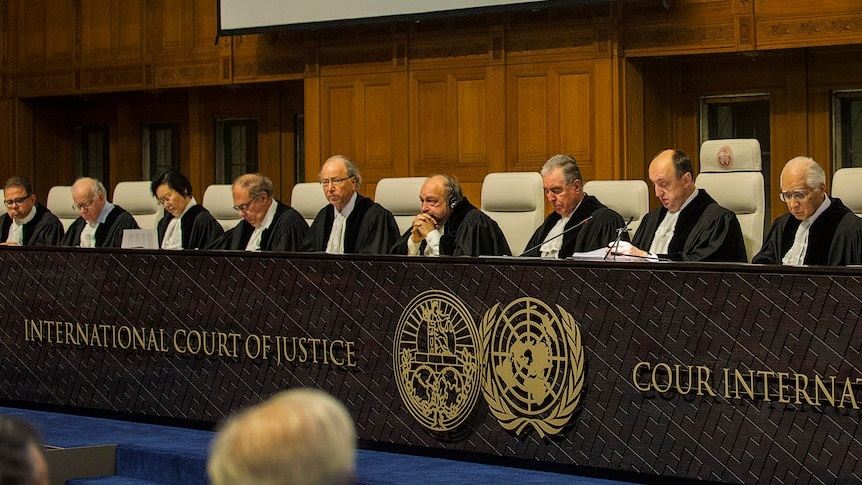The United Nations has adopted a landmark resolution asking the International Court of Justice (ICJ) to deliver an opinion on climate change and the legal consequences countries face for harming the environment.
It is the culmination of a four-year push led by Vanuatu and other Pacific nations to get climate change in front of the world’s highest court.
Vanuatu Prime Minister Ishmael Kalsakau described the decision as a “massive win for countries feeling the effects of natural disaster, after natural disaster”.
“There can be some resolution upon how we respond to the effects that we’re facing as smaller countries, and the court can clarify what the obligations and duties are with countries that are involved with some of these disasters,” he said.
The bid eventually won the support of 120 co-sponsors, including Australia and the celebrity endorsement of Jane Fonda.
“The science is clear. As long as the world fails to eliminate our collective addiction to fossil fuels, climate impacts will only get worse and more and more people will suffer,” she said.
Through the resolution, world leaders asked the ICJ to form an advisory opinion clarifying international legal consensus on climate change’s impacts on human rights and the rights of future generations.
The opinion will be non-binding, but experts say it could influence the outcome of climate change court cases around the world.
What is an advisory opinion?
As the UN’s judicial arm, the ICJ is often asked to provide answers to legal questions to guide UN organisations and member countries.
These are called advisory opinions and outline what current international law has to say about a given legal question brought to the court through a UN resolution. While the court’s rulings are not binding, they influence international opinion.
In the past, the ICJ has considered the legality of constructing an Israeli-built separation barrier, and ordered Myanmar to prevent acts of genocide against Rohingya Muslims.
The opinions themselves are not judgements, and the ICJ does not have the power to jail, fine or punish individuals or companies on the basis of them.
But according to Professor Margaret Young, an international law expert at Melbourne Law School, they carry legal weight and moral authority that can influence future decisions.
“Advisory opinions are requests from United Nations organs like the General Assembly for advice on legal questions to guide those organs in how they respond to issues … [and] are not intended to be binding on states.”
What does it call for?
The resolution, drafted by 18 countries, has asked the ICJ to rule on: What obligations do states, under international law, have to ensure the protection of the climate system and other parts of the environment from anthropogenic emissions of greenhouse gases for States and for present and future generations.
What legal consequences there are under these obligations for states where they, by their acts and omissions, have caused significant harm to the climate system and other parts of the environment, with respect to: (a) States, including, in particular, small island developing states, which due to their geographical circumstances and level of development, are injured or specially affected by or are particularly vulnerable to the adverse effects of climate change; and (b) Peoples and individuals of the present and future generations affected by the adverse effects of climate change
Will it make a difference?
Prof Young said despite being non-binding, ICJ opinions were effective and could influence laws overseas.
This was highlighted in an advisory opinion on the sovereignty of Western Sahara in 1975.
“Australia didn’t participate in that opinion, but subsequently, that opinion was cited by our High Court in the landmark Mabo decision of 1992 that found terra nullius to be a legal fiction in Australia, leading to massive changes to the law,” Prof Young said.
Advisory opinions on climate change could strengthen legal cases and clarify where countries are responsible for the carbon they emit, she said. “There is still uncertainty about the content of state obligations, despite the Paris Agreement and the United Nations Framework Convention on Climate Change.”
Why did Vanuatu lead the push?
Vanuatu, home to about 300,000 people across roughly 80 islands, has been labelled the most at-risk country in the world for natural disasters.
In late February, Vanuatu was hit by two cyclones just days apart, shining a light on its vulnerability to climate change.
But this push was an initiative by University of the South Pacific law students in 2019 who worked to get climate justice on the UN’s agenda.
Vanuatu’s Climate Change Minister Ralph Regenvanu, who then began raising their plight to world leaders, said the country had always led on issues of climate justice.
“We were a founding member of the association of small island states and the first chairman of that group, which is now one of the main climate lobbies at COP,” he said.
“We were the country to first raise loss and damage in the United Nations Framework Convention on Climate Change in 1981.
“We’ve been a leader in many ways on climate change.” Mr Regenvanu hopes an advisory opinion will embolden Pacific people in their fight for climate justice.
“The good thing about an ICJ advisory opinion is that no matter what court you’re arguing — whether it be at the lowest level or the highest level — it applies,” he said.
• Prianka Srinivasan is a journalist at the ABC’s Asia Pacific Newsroom. Fred Hooper is a presenter on ABC Pacific Prepared and Melissa Maykin is a journalist with the Asia- Pacific Newsroom, covering the Pacific. The views expressed in this article are the authors’ and do not necessarily reflect the views of this newspaper.



